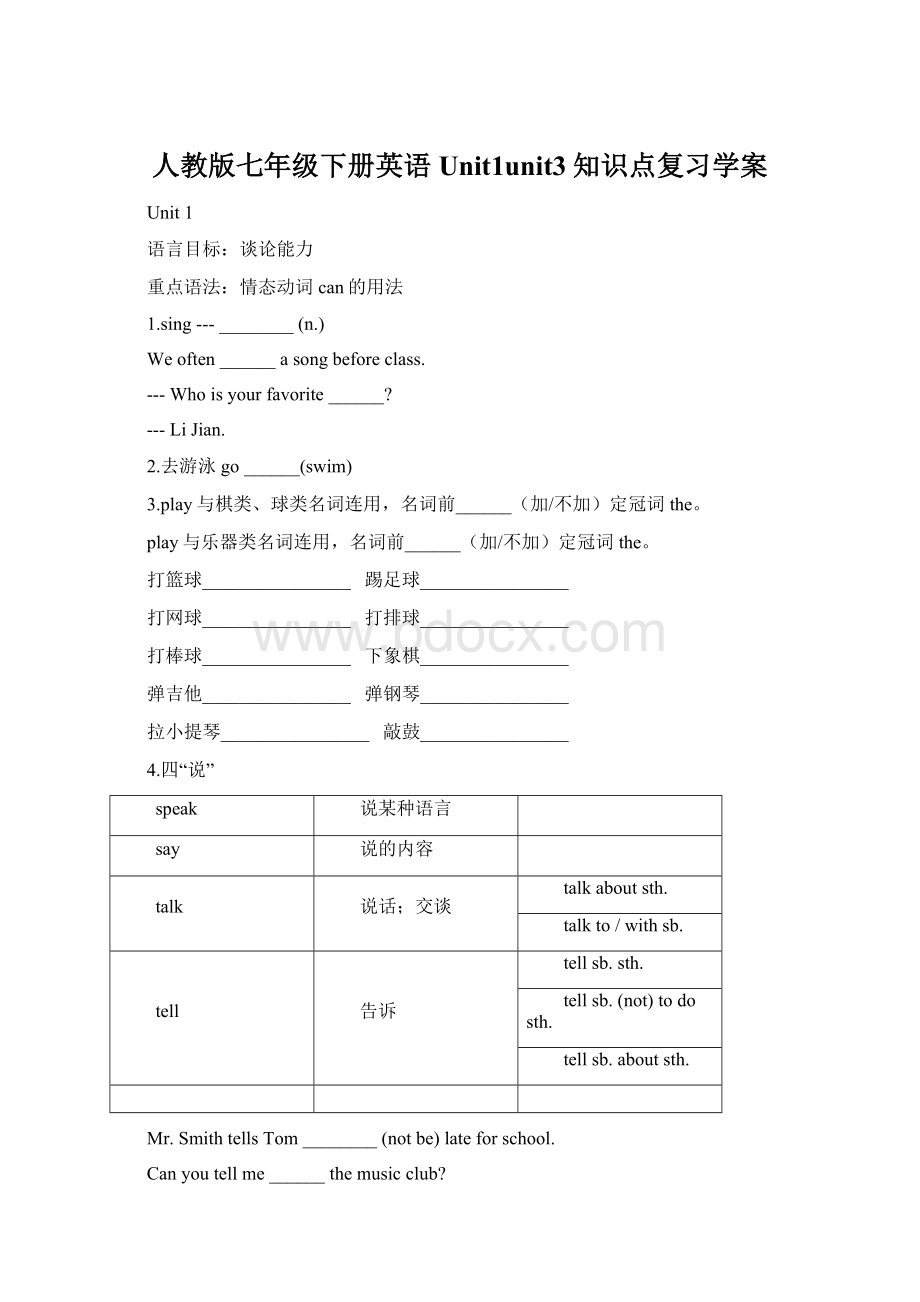人教版七年级下册英语Unit1unit3知识点复习学案Word格式文档下载.docx
《人教版七年级下册英语Unit1unit3知识点复习学案Word格式文档下载.docx》由会员分享,可在线阅读,更多相关《人教版七年级下册英语Unit1unit3知识点复习学案Word格式文档下载.docx(18页珍藏版)》请在冰豆网上搜索。

Theyare________thenewfilm.
5.join表示加入某个社团、机构或组织,成为其中的一员。
takepartin指参加活动,并在活动中发挥作用。
Let’s______themusicclub.
Jenny________manyschoolactivities.
6.begoodat________________=________________
begoodfor________________
begoodwith________________
Heisgoodat______(play)basketball.
Milkisgood______ourhealth.
Areyougood______children?
7.write---______(n.)
LiLei________(给……写信)hismotheronceamonth.
________(写下,记下)mytelephonenumber.
8.show作名词,意为“________”。
talkshow________fashionshow________
show作动词,意为“______________”。
showsb.sth.=________________
PleaseshowmeyourIDcard.
showsb.aroundsp.____________
9.or用于疑问句中,意为“______”。
or用于否定句中,意为“______”
。
“祈使句,or+陈述句”中,or意为“______”。
Doyoulikeapples______oranges?
Idon’tlikeapples_____oranges.
Ilikeapples______oranges.
Putonyourcoat,______youmayhaveacold.
10.选择疑问句是指提出两个或两个以上的答案供对方选择的句式。
供选择的部分常用______来连接。
注意:
选择疑问句______(能/不能)Yes或No来回答。
11.三“也”
also常用与___定句中,位于be动词、助动词或情态动词之____,实义动词之____。
too常用与___定句中,位于句子____,前加逗号。
either常用与___定句中,位于句子____,前加逗号。
We_____liketoeathamburgers.
Idon’tliketoeathamburgers,______.
Weliketoeathamburgers,______.
12.三“家”:
family+house=home
Welcometomy______.Weliveinabig______.Allmy______loveeachother.Weareahappy______.
13.和某人交朋友make______(friend)______sb.
14.helpsb.(to)dosth.=helpsb.withsth.
Ioftenhelpmymother______thehousework.
Ioftenhelpmymother______(do)thehousework.
15.teach---______(n.)
teachsb.sth.其中sb.必须使用人称代词____格。
teachsb.______(do)sth.
Mr.Smithteaches_____(我们)English.
16.music---______(n.)音乐家---______(adj.)音乐的
17.情态动词表示说话人对动作的观点,如需要、可能、意愿等。
情态动词只有情态意义,不能单独作谓语。
1)情态动词____(随/不随)人称和数的变化而变化。
2)情态动词后加动词_____形。
18.情态动词can的用法:
1)表示能力,意为“______”。
---她会说英语吗?
____________________
---是的,她会。
____________________
2)表示许可或请求,意为“______”。
你可以帮我学英语吗?
____________________
3)表示否定意义的推测,意为“______”。
---这本书是Gina的吗?
__________________
---不,这本书不可能是她的。
__________________
Jim’snameisonthebook.
一定是Jim的。
__________________
19.
肯定句
否定句
一般疑问句
特殊疑问句
Unit2Whattimedoyougotoschool?
类别
课程标准要求掌握的内容
话题
Dailyroutines日常作息习惯
SectionA
单词
upadv.向上dressv.穿衣服n.连衣裙
brushv.刷;
刷净n.刷子toothn.(pl.teeth)牙齿
showern.&
v.淋浴n.淋浴器(间)usuallyadv.通常地;
一般地
fortynum.四十neveradv.从不;
绝不
earlyadv.&adj.早(的)fiftynum.五十
jobn.工作;
职业workv.&
n.工作
stationn.电(视)台;
车站o’clockadv.(表示整点)……点钟
nightn.晚上;
夜晚funnyadj.奇怪的;
滑稽好笑的
exercisev.&
n.锻炼;
练习bestadj.最好的adv.最好地;
最
groupn.组;
群wowinterj.(表示惊奇或敬佩)哇;
呀
短语
getup起床;
站起getdressed穿上衣服
takeashower洗淋浴radiostation广播电台
onweekends(在)周末atnight在晚上
from…to…从……到……belatefor……迟到
句型
1.—Whattimedoyouusuallygetup,Rick?
里克,你通常几点起床?
—Iusuallygetupatsixthirty.我通常六点半起床。
2.—WhendoesScottgotowork?
斯科特什么时候上班?
—Healwaysgoestoworkateleveno’clock.He’sneverlate.
他总是十—点上班。
他从不迟到。
3.That’safunnytimeforbreakfast!
那个时间吃早饭真有意思!
SectionB
halfn.&
pron.一半;
半数pastprep.晚于;
过(时间)adj.过去的
quartern.一刻钟;
四分之一homeworkn.家庭作业
runv.跑;
奔cleanv.打扫;
弄干净adj.干净的
walkn.&
v.行走;
步行quicklyadv.很快地
eitherconj.或者adv.也(用在否定词组后)
lotpron.大量;
许多sometimesadv.有时
tastev.有……的味道;
品尝n.味道;
滋味
lifen.(pl.lives)生活;
生命
halfpastsix六点半aquartertoseven七点差一刻
do(one’s)homework做作业takeawalk散步;
走一走
either…or…要么……要么……;
或者……或者……
lotsof大量;
许多begoodfor对……有益
1.Intheevening,IeitherwatchTVorplaycomputergames.
在晚上,我要么看电视,要么玩电脑游戏。
2.Sheknowsit’snotgoodforher,butittastesgood!
她知道这对她的身体不好,但它(冰激凌)尝起来很好吃。
3.Attwelve,sheeatslotsoffruitandvegetablesforlunch.
12点时,她吃许多水果和蔬菜作为午餐。
4.Ihaveaveryhealthylife.我过着非常健康的生活。
语法
1.频度副词的用法
2.时间的表达法写作介绍日常作息习惯
1.getdressed
getdressed意为“穿上衣服”,表示穿的动作。
例句:
Hecan’tgetdressedhimself.他不会自己穿衣服。
拓展:
bedressedin“穿着”,表示穿的状态。
Sheisdressedinred.她穿着红色的衣服。
2.介词at
at介词,意为“在……”。
表示时间时一般跟表示钟点的词。
如:
at6:
00在六点。
介词at,in,on表示时间的用法:
(1)介词at常用于时刻前或一些固定的习惯用语中。
athalfpastten在10点半,atnoon在中午。
(2)介词in用在月份、季节、年份等前面,也可以表示在早上、在下午或晚上。
inMay在5月,insummer在夏季,inthemorning在早上。
(3)介词on用在日期、星期几、节日前,也用来表示具体某一天的上午、下午或晚上。
onMonday在星期一,ontheafternoonofJuly5th在7月5日的下午。
3.never
副词,意为“从不;
决不”;
常置于be动词、助动词或情态动词后,行为动词前。
Mysisterisneverlateforschool.我姐姐上学从不迟到。
辨析:
never,always,usually与sometimes
never意为“从不;
决不”。
I’llnevergiveup.我决不会放弃。
always意为“总是”,表示动作重复或状态持续,中间没有间断。
Thesunalwaysrisesintheeastandsetsinthewest.太阳总是东升西落。
usually意为“通常;
平常”,即很少有例外。
Heusuallygoestobedatteno’clock.他通常10点钟上床睡觉。
sometimes意为“有时”,表示动作偶尔发生。
可以位于句首,以示强调。
Itissometimeshotandsometimescold.天气忽冷忽热。
4.from…to…
from…to…意为“从……到……;
从……至……”。
Howfarisitfromyourofficetothebank?
从你的办公室到银行有多远?
5.when
when作疑问副词,引导特殊疑问句,意为“什么时候;
何时”。
Whendoyouusuallygethome?
你通常什么时候回家?
—Whenisyourbirthday?
你的生日是哪一天?
—MybirthdayisonFebruary6th.我的生日是2月6日。
6.钟点时刻的表达法
英语中钟点时刻的表达方式:
(1)采用数词表达时间。
seventhirty七点半,sevenfifteen七点十五。
(2)采用介词past和to。
一般说来半个小时以内,常用介词past,表示“几点过几分”;
半小时过后常用介词to,表示“差几分到几点”。
aquarterpasteight八点一刻,twenty-fivetofive四点三十五。
(3)AM和PM。
AM表示“午前;
上午”;
PM表示“午后;
下午”。
在使用时,常用小写形式am和pm。
在美式英语中,使用形式为a.m.和p.m.。
7a.m.上午七点,5p.m.下午五点。
7.either…or…
either…or…“要么……要么……;
或者……或者……;
不是……就是……”,连接句子中两个独立的词、短语,甚至独立的句子。
EitheryouorIgotheretomorrow.明天要么你去那儿,要么我去。
8.begoodfor
begoodfor意为“对……有益;
对……有好处”;
其反义短语bebadfor意为“对……有害;
对……有坏处”。
Eatingmorevegetablesisgoodforyou.多吃蔬菜对你有好处。
9.dailyroutine
Letmetellyouaboutmydailyroutine.Ioftengetupat6:
00.ThenIwashmyfacequickly.Ieatmybreakfastat6:
30.UsuallyIhavemilkandbreadforbreakfast.Igotoschoolat7:
00.Classesbeginat8o’clock.Iusuallyhavefourclassesinthemorning.
Pleasewritetomeandtellmesomethingaboutyourmorning.
频度副词的用法
频度副词是副词的一种,通常和一般现在时连用,表示现在经常或反复发生的动作。
本单元出现的频度副词有always,usually,sometimes,never。
always是频度最大的词,意为“总是;
永远”;
usually意为“通常”,即很少有例外,频度仅次于always;
sometimes意为“有时”;
never意为“从不”。
Mikealwayscomesveryearly.约翰总是来得非常早。
Iusuallygotoschoolbybus.我通常乘公共汽车上学。
Hesometimesplaysbasketballafterschool.他有时放学后打篮球。
Iwillnevermakethesamemistakefromnowon.我从现在开始将不会犯任何错误。
(1)频度副词一般放在实义动词之前,be动词、助动词或情态动词之后。
Iusuallytakeashowerateightthirty.我通常八点半洗淋浴。
Lucyissometimesverybusy.露西有时很忙。
(2)对频度副词提问时,用howoften。
—Howoftendoyouexercise?
你多久锻炼一次?
—Hardlyever.几乎从不。
1.Sheis_____inabeautifulskirt.
A.dressedB.dressingC.puttingonD.wearing
2.—WhendidtheterribleearthquakehappeninYa’an,Sichuan?
—Ithappened____8:
02_____themorningofApril20th,2013.
A.on;
inB.at;
onC.at;
inD.on;
on
3.—Doyouoftengotothegym?
—No,_______.Idon’tlikesportsatall.
A.alwaysB.usuallyC.neverD.often
4.—______isherbirthdaythisyear?
—InAugust.
A.WhenB.WhatC.How
5.Theboydoeshishomeworkathalf_________sevenintheevening.
A.toB.pastC./
6.IhavetwoticketsforJJLin’sconcertthisSaturdaynight.____you____shecangowithme.
A.Both;
andB.Neither;
norC.Either;
orD.Notonly;
butalso
7.Fruitis______yourhealth.
A.goodtoB.goodwithC.badforD.goodfor
8.Jackhasavery______life.
A.healthyB.healthC.healthilyD.healths
Unit3Howdoyougettoschool?
一、根据句意,用括号内所给单词的适当形式填空。
1.–Canyoursister______(ride)abike?
–Yes,shecan.
2.Mikeusually______(get)toschoolat7:
45inthemorning.
3.Mysister______(walk)totheclothesstoreeveryday.
4.Howabout______(take)thesubwaytoschooltoday?
5.Look!
Herearethree______(bus).
二、单项选择
()1.Johnusually______thesubwaytoschool.
A.walksB.getsC.takesD.rides
()2.Mymothergoestowork______herbike,butIgotoschool______bus.
A.in;
onB.by;
byC.on;
byD.by;
()3.--______doyouusuallygotoschool?
--Bybike.
A.WhenB.HowC.WhatD.Where
()4.Ialwaysridea______toschool.Ithinkit’sgoodformyhealth.
A.trainB.busC.walkD.bike
()5.Iwalktoschool.______?
A.HowareyouB.Whatdoyoudo
C.HowaboutyouD.Whataboutyourschool
三、按要求完成句子,每空一词。
1.Weoftengohomeonfoot.(改为同义句)
Weoften______home.
2.Theyoftentakeabustogotowork.(改为同义句)
Theyoftengotowork____________.
3.DoesLisarideherbiketoschool?
(作否定回答)
______,she______.
4.Shetakesthesubwaytoschool.(对画线部分提问)
____________shegotoschool?
5.Lindasometimestakesthebustoschool.(改为一般疑问句)
______Lindasometimes______thebustoschool?
一、根据句意及首字母或汉语提示填写单词。
1.Seventyandthirtyisoneh______.
2.It’saboutfivek______fromourschooltoyourhome.
3.Doyouneedtogotoschoole______day,Tom?
4.This______(新的)bagismine.
二、根据句意,用括号内所给单词的适当形式填空。
1.Ittakesmetwohours______(do)myhomeworkeveryday.
2.–Howabout______(play)soccerthisafternoon?
--Goodidea
3.Ittakesme45_______(minutes)togettoschoolbybikeeverymorning.
4.Thebusrideusually